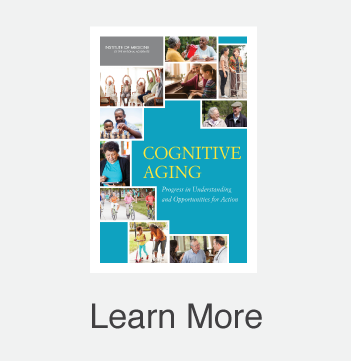

-
True or false: Cognition is another term for memory.
- True
- False
Although cognition includes memory, it also refers to the mental functions involved in attention, thinking, understanding, learning, solving problems, and making decisions. Cognition is a fundamental aspect of an individual's ability to carry out activities, accomplish goals, and successfully engage with the world.

-
True or false: Cognitive aging is not the same as dementia or Alzheimer's disease.
- True
- False
Cognitive aging is not a disease or a quantifiable level of function, and it does not inevitably lead to dementia or Alzheimer's disease. Just like other parts of the body, the human brain changes with age, both in its physical structures and in its ability to carry out various functions.

-
At what age in life does cognitive aging typically begin?
- A. It begins at birth and continues throughout the life span
- B. After age 35
- C. After age 50
- D. After age 65
Although the effects of cognitive aging are often most visible later in life, cognitive aging is a lifelong process that occurs in every individual regardless of initial cognitive function. The types and rates of change can vary widely among individuals.

-
True or False: It is possible to promote and support cognitive health and adapt to changes in cognitive function.
- True
- False
Numerous factors may affect cognitive abilities, including genetics, physical activity and other lifestyle choices, traumatic brain injury, sleep quality, health conditions, acute illness, and medications. Some of these factors may be modifiable to support cognitive health. Experience, education, expertise, and support strategies (such as memory aids) can help compensate for declines in cognition.

-
Which of the following actions are supported by evidence for promoting cognitive health?
- A. Staying physically active
- B. Reducing and managing cardiovascular risk factors
- C. Regularly reviewing medications and supplements with a clinician
- D. All of the above
There is evidence that staying physically active, reducing and managing cardiovascular risk factors (such as hypertension, diabetes, and smoking), and reviewing health conditions and medications that may affect cognition with your health care provider can help maintain cognitive health across the life span. The IOM committee did not find strong evidence that taking vitamins or supplements or medications advertised to improve memory affects cognitive health.




